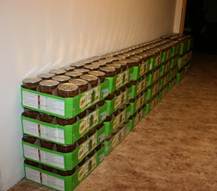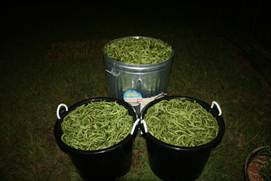Fight Back Against Food Price Increases
This year's garden started out at as a "we'll just see what we get"
garden. What's that, you ask? It's really quite simple.
Because of one thing after another, we had neglected to plant a garden
for two years. The only thing we didn't neglect to do was buy seed. So
for two years those little packets and bags of seed got stuffed into a
box with good intentions but no action. This year, with food prices
spiraling upward, we decided that no matter what, we were going to plant
our garden. There'd be no excuses this year.
We also decided we weren't going to buy any more seed. We had plenty. We
had purple hull peas, we had crowders, green beans, wax beans, okra,
squash, tomatoes, eggplant, cucumber, broccoli, and goodness knows what
else.
And even though we had not planted a garden for the last two years, the
hubs had still been amending the garden spot with natural compost and
manure. Each time he'd go out with the tractor he'd also widen the
garden spot just a bit more.
Now to say you have a garden spot 300 feet long by 125 feet wide isn't
impressive when, with our economy the way it is, we're used to talking
in terms of billions and trillions. Anything in the "hundreds" just
doesn't seem to have the punch it used to.
That may apply to the US debt, but let me guarantee you... it in no way
applies to a garden. So we took every packet and bag of seed we had this
year and planted it. We figured, at best, 25 to 30 percent of it would
come up. After all, the seed was old.
 Come
to find out... the seed wasn't that old. As you can see from
the picture, everything began sprouting, and this doesn't include the
raised garden beds or the blueberry bushes we have as well. As the hubs
and I looked out over all these plants coming up, the only thought in
the back of our heads was, "Oh... my... gosh... what have we done?"
Come
to find out... the seed wasn't that old. As you can see from
the picture, everything began sprouting, and this doesn't include the
raised garden beds or the blueberry bushes we have as well. As the hubs
and I looked out over all these plants coming up, the only thought in
the back of our heads was, "Oh... my... gosh... what have we done?"
To say that the harvest came in strong would be an understatement. Three
rows of squash plants threatened to take over the world. The people in
our neighborhood locked their doors and refused to answer when we came
calling with our excess harvest from the garden. We took to stuffing
bags in cars, but they got wise to us and began locking those too.
 I
had canned some of the food, but because we don't have a full-blown
pantry yet, I was hesitant to can too much. Where would we put it? After
a family powwow, we decided we'd can now and build the pantry later.
I
had canned some of the food, but because we don't have a full-blown
pantry yet, I was hesitant to can too much. Where would we put it? After
a family powwow, we decided we'd can now and build the pantry later.
It's over 1,000 jars later... and they are lined up everywhere in the
house that there's an empty spot. This is my hallway at 600+ jars...
they're stacked up to the thermostat now. You're probably thinking that
I'm a masochist at best, and what in the world will we do with all this
food... but think about it.
If you have two vegetables and a meat per meal, you'd need about 2200
jars of food to cover two meals a day for 365 days of the year for a
typical family of four. (I don't count breakfast in this calculation...)
You can get by without figuring in the harvest months because you can
eat directly out of the garden.
However, this is more than a story about my garden and the steps I took
to preserve the harvest. I don't know about you, but my grocery bill has
been so astronomical in comparison to what I buy, it's not even funny...
and I don't even have kids at home. In this depressed economy, I can't
imagine how families are making it. Whereas we used to joke we couldn't
go to the grocery store without spending $100, now it's up to $150 -
$200 for the same 5 or 6 bags.
And when you factor in the genetically modified crops that are linked to
all kinds of health concerns going on with our bodies which are being
used in mass production, and the limited nutrition of the food we are
buying, you might as well go outside and grab some bark off a tree and
boil it... it'll probably taste just the same and give you more
nutrition.
The thing I have discovered with canning my food (and I've tried
freezing it, but after the malfunction of two freezers and the amount of
food I had to throw out, I'm not a freezer fan anymore) is that not only
do I save TONS of money, I'm giving my family better tasting and more
nutritious food. Yes, the initial outlay on jars was a factor, but if
you catch them on sale or buy them up at garage or estate sales, you can
find some great bargains. And the jars are forever.
But maybe the only thing you've ever tried to can was a few tomatoes or
some jelly from in-season fruit. You feel wholly inadequate to tackling
a full-fledged garden or even canning meat. And the thought of a 1,000+
jars just puts you under.
Look, you don't have to go bonkers like I did. I've been canning for
many years, so while the amount of food which needed processing was
overwhelming, the job itself was not. If you're new to this whole food
preservation thing, then what you need to do is get your feet wet with a
few items at first and then expand into other foods. But where do you
start?
I'd like to suggest with the DVD,
Food Storage Secrets. This comprehensive DVD
series shows you how to can from beginning to end, and it includes foods
you may not have thought you could process - such as meats. This DVD set
starts out with the basics, from equipment needed to the preparation
process involved in the different types of food. Not only do you get a
visual presentation of the entire canning process, from beginning to
end, this set also comes with an eBook manual of instructions that you
can print out and use in the kitchen each time you can.
Not only that, but there's a bonus DVD in this set on food dehydration
secrets and techniques. Not only is canning a viable way of putting food
up, so is dehydrating and this DVD will get you started with that as
well.
 We
were exceptionally blessed this year in our garden. I've also seen
exceptional values and sales at our local farmers market and from the
largesse of friends and family whose gardens also produced well. When I
look at the picture to the right of just the green beans that we got
from one day's harvest, I'm not seeing all the hard work that went into
growing and putting these up. I'm seeing the 80 cents to 1 dollar a can
I saved by canning them. I'm seeing the nutrition of home-grown food
versus the empty calories of processed goods.
We
were exceptionally blessed this year in our garden. I've also seen
exceptional values and sales at our local farmers market and from the
largesse of friends and family whose gardens also produced well. When I
look at the picture to the right of just the green beans that we got
from one day's harvest, I'm not seeing all the hard work that went into
growing and putting these up. I'm seeing the 80 cents to 1 dollar a can
I saved by canning them. I'm seeing the nutrition of home-grown food
versus the empty calories of processed goods.
Is it hard work? Yes... but so is anything of value worth having. Many
people that I come into contact with are beginning to see the need for
learning these vital homesteading skills, not only to get them through
tough economic times ahead, but to address health and nutrition concerns
as well. And it's never too late to start.
And just because summer is winding down doesn't mean canning season is
too. There are winter crops on the horizon that can be preserved as
well. If your family enjoys hunting or you're beginning a small farm,
the ability to can meat is an added value. It's never too late to begin
learning the fundamentals of food storage secrets and for that you need
Solutions From Science's
Food Storage Secrets DVD set.
Sincerely,
Hanne Moon
Editor, Off the Grid News
P.S. Don't turn away from learning these time honored food storage techniques just because you live in an apartment or home with no gardening capabilities. You have options as well. When I was in your very situation, I would look for deals at the grocery stores to stock my panty. When chicken went on sale, I was there, buying what I could and putting it up into jars. When our local grocery store overstocked on carrots and had a massive price reduction to move them out, I was there with a grocery cart, buying every bag I could. You are limited only by your imagination, and if your imagination is leaning you to learning how to get off the grid, then you need to click here to order your copy of Food Storage Secrets today.
Solutions From Science
815 W. Main St.
P.O. Box 518
Thomson, IL 61285
Email us at info@solutionsfromscience.com